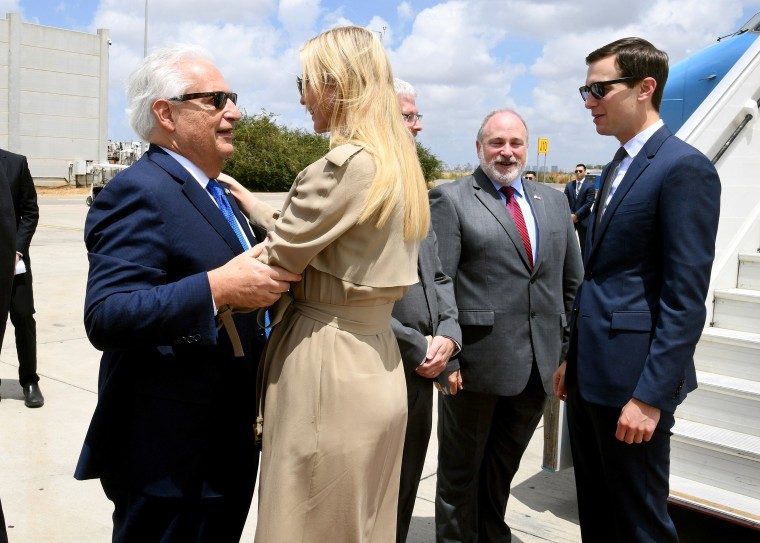With less than a week to go until Israel hopes to move forward with annexation, it's unclear whether it has the support of its most important ally — the U.S.
U.S. envoys arrived in Israel on Friday as the Trump administration remained undecided on whether to support the country’s plans to extend sovereignty to parts of the occupied West Bank, a senior White House official told NBC News.
Ambassador to Israel David Friedman and White House Special Envoy Avi Berkowitz left for Israel Thursday night, along with mapping expert Scott Leigh, for further meetings and analysis, the official said.
Their visit comes after several days of White House meetings on the topic that also involved presidential adviser Jared Kushner. The official told NBC News on Thursday that the meetings were “productive” but inconclusive, alluding to concerns about how annexation could affect the Trump administration’s Mideast peace plan.
“There is yet no final decision on next steps for implementing the Trump plan,” the official said.
Friedman had returned to Washington for the highly anticipated meetings with Kushner and other top U.S. officials involved in Mideast policy.
Netanyahu has been looking for formal U.S. support before proceeding. His government's coalition agreement says that as of July 1 the prime minister can bring annexation up for debate with his Cabinet.

Palestinians strongly oppose the move and consider it a violation of international law. They hope the West Bank, which was captured by Israel from Jordan in the 1967 Arab-Israeli war, will form a major part of a future Palestinian state with east Jerusalem as its capital.
It remains unclear exactly what land Netanyahu plans to annex, but he has indicated that it will fit within the Trump administration’s plan for peace in the region, announced in January.
The U.S. plan would allow Israel to annex about a third of the West Bank, including major settlement blocs, as well as the strategic and fertile Jordan Valley, the region's breadbasket, on the border with Jordan. It also envisages a separate Palestinian state but one that falls short of Palestinian demands.
The Palestinians have rejected the Trump plan as skewed toward Israel.

Earlier this year, the senior administration official told NBC News that Israel's agreeing to negotiations with the Palestinians was one of the conditions for the U.S. to recognize Israeli sovereignty over parts of the territory. It remains unclear whether Washington will greenlight Netanyahu’s plans if there is no sign of negotiations.
Secretary of State Mike Pompeo reiterated Wednesday that decisions about extending sovereignty were for Israel to make.
"We unveiled a Middle East peace vision, some number of months ago now and we're continuing to work down that path," he told reporters.
The majority of the international community is opposed to annexation, with many fearing that it will deal a blow to hopes for a viable Palestinian state and make regional peace even harder to achieve. A two-state solution based on the 1967 lines is still widely seen as the only way of resolving the decadeslong conflict.
The 1967 lines refers to the armistice lines before the Arab-Israeli war of that year in which Israel captured the West Bank and east Jerusalem from Jordan and the Gaza Strip from Egypt among other territory.


